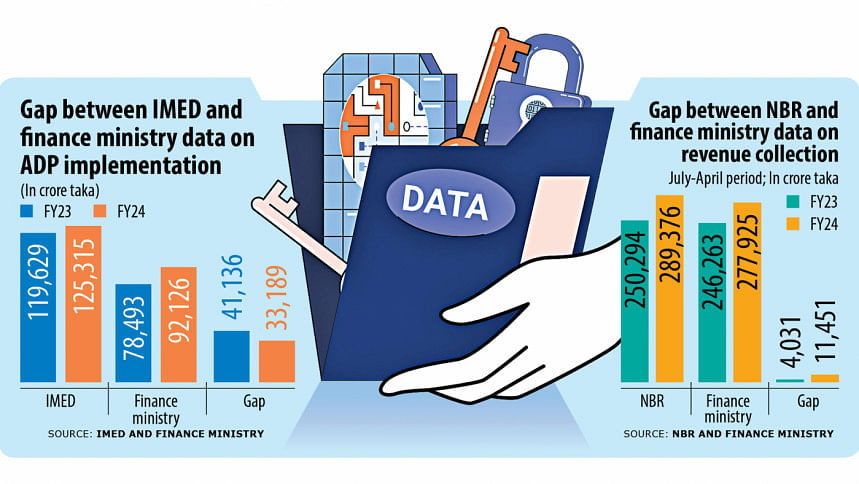Data anarchy in revenue and expenditure continues

Although the authorities took steps to eliminate mismatches in export data in recent months, discrepancies in the data of revenue collection and expenditure among government agencies continue to persist.
Finance ministry data showed that tax collection stood at Tk 277,925 crore in July-April of fiscal year (FY) 2023-24. But in the same period, the National Board of Revenue (NBR) said it had collected Tk 289,376 crore.
This means that the gap in revenue collection figures between the two stood at around Tk 11,451 crore in this period.
Such a scenario is nothing new. The tax collection figures published by the finance ministry and NBR showed a Tk 4,031 crore discrepancy in the July-April period of FY23.
"If our expenditure calculation is wrong or exaggerated, then whatever plans we make based on it will be based on a weak foundation," said Zahid Hussain, an economist
Officials said the finance ministry usually calculates tax receipts based on reports from the Office of the Controller General of Accounts (CGA) whereas the tax administration counts revenue collection by taking outstanding dues into account.
This is a major reason for the gap.
Similar anomalies also exist in the calculation of expenditure under the Annual Development Programme (ADP).
The Implementation Monitoring and Evaluation Division (IMED), which operates under the planning ministry, said ministries and divisions spent Tk 125,315 crore during the July-April period of FY24.
On the other hand, the finance ministry said total spending in the period amounted to Tk 92,126 crore, which is Tk 33,189 crore lower than the IMED's figure.
This is also not a one-off incident. The difference between the IMED and the finance ministry in terms of ADP spending stood at Tk 41,136 crore in the first 10 months of FY23.
Economists believe such discrepancies could cause big problems in fiscal and overall economic planning.
"If the finance ministry doesn't get the actual data on spending, it hampers debt planning. If our expenditure calculation is wrong or exaggerated, then whatever plans we make based on it will be based on a weak foundation," said Zahid Hussain, a former lead economist at the World Bank's Dhaka office.
"It is akin to driving blindly. You may fall into a ditch."
He added that the CGA's figure is more reliable as it is based on actual receipts, adding that many had raised demands to form a data commission to remove the anomalies.
Hussain cited Prof Wahiduddin Mahmud, the interim government's planning and education adviser, and said there are two types of errors. One is deliberate manipulation of data, which is done to enhance the image of the government. Another is inadvertent, which can occur due to accounting errors.
"If there is an accidental error in data generation, the real output will vary or fluctuate," he said. " If there are any intentional faults, it must be stopped."
In April, the Bangladesh Bank discovered that actual exports in the July-April period of FY24 were nearly $14 billion below the shipment value of goods published by the Export Promotion Bureau earlier.
Ashikur Rahman, principal economist at the Policy Research Institute of Bangladesh, said data governance had become a major issue over the last few years.
"If we look at the estimates of growth, inflation, export, revenue, and expenditure, we will see that data discrepancy is quite vivid," he said.
This is an issue that the government must strongly address because economic management will be very complicated without an accurate picture of macroeconomic and key fiscal indicators, Rahman said.
"A stronger focus on data governance could also lead to prudent economic management. This is true for export data, inflation and growth and it is also true for internal data such as expenditure and revenue earnings."
He hoped data governance would become an important priority area for the interim government, saying: "Without this, we cannot get an accurate picture of the current state of the economy."
Acknowledging the data mismatch, newly appointed NBR Chairman Md Abdur Rahman Khan said he had already instructed officials concerned to maintain a unified figure among the NBR, CGA and Bangladesh Bank.
"I clearly said that I won't accept any figures that are manually calculated. All three figures will be the same," he told The Daily Star yesterday.
Asked about the reasons for the mismatch, he said it may have happened because of outstanding dues.
IMED Secretary Abul Kashem Md Mohiuddin could not be reached over the phone for comment.
However, IMED officials earlier said it calculates ADP expenditure based on information supplied by ministries and divisions. On the other hand, the finance ministry calculates it based on data from the CGA.


 For all latest news, follow The Daily Star's Google News channel.
For all latest news, follow The Daily Star's Google News channel. 





Comments